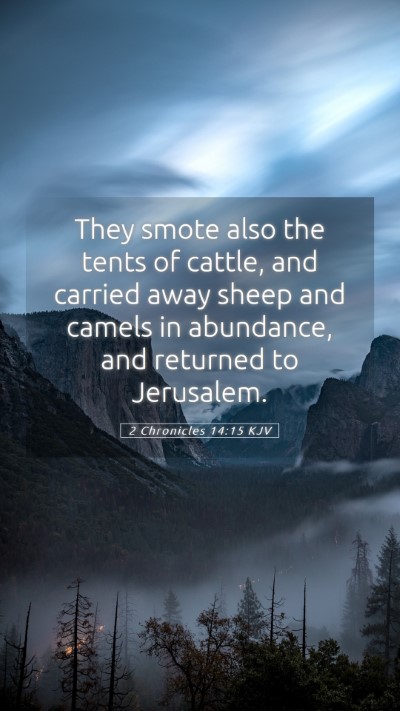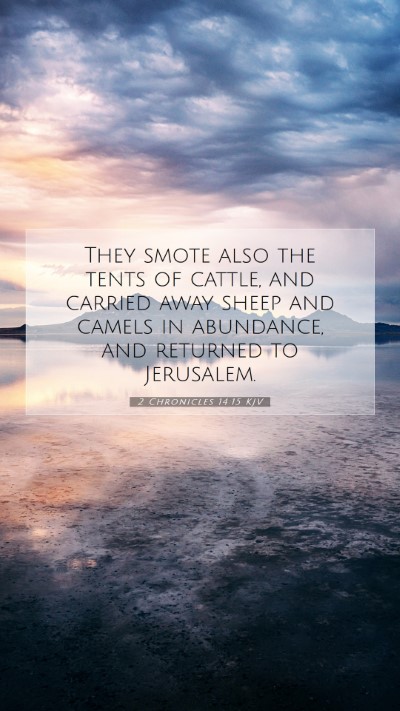Understanding 2 Chronicles 14:15
Verse: “And they smote all the cities round about Gerar; for the fear of the Lord came upon them: and they spoiled all the cities; for there was exceeding much spoil in them.”
Bible Verse Meaning
This verse describes a significant military victory led by King Asa of Judah. The account reveals not just a physical battle but reflects deeper spiritual truths.
Historical Context
The events of this verse take place during a time of conflict between Asa and the Ethiopian king Zerah, who commanded a vastly larger army. Asa's reliance on God in this battle sets a precedent for faithful leadership in Israel. The success in conquering the cities around Gerar indicates that God is favorably inclined towards those who trust in Him, enabling them to overcome seemingly insurmountable odds.
Bible Verse Interpretations and Commentary
-
Matthew Henry's Commentary:
Henry emphasizes that the fear of the Lord is a key element here. It leads to divine intervention, resulting in victory against foes. This fear served as both a deterrent and a catalyst for Asa's military conquests, shaping the nations’ response to God's people.
-
Albert Barnes' Insights:
Barnes highlights the abundance of spoil obtained during the conquests. This indicates the blessings of God upon Asa for his faithfulness and reforms. The spoils symbolize not only material wealth but spiritual enrichment through obedience and reliance on God.
-
Adam Clarke's Analysis:
Clarke points to the psychological aspect of the fear of the Lord striking the heart of the adversaries. It signifies that God’s presence can turn the hearts of enemies and alter the course of events in favor of His people.
Spiritual Insights and Applications
The passage is rich with theological implications applicable to believers today. It encourages individuals to recognize the power of God in their conflicts and the importance of approaching life with a reverential fear of the Lord. This fear not only brings about His protection but also fosters an environment where spiritual and material blessings flourish.
Applying Bible Verses to Daily Life
In practical terms, this verse calls believers to trust in God's sovereignty amidst trials, promoting a sense of peace when facing opposition. It serves as a reminder that faith is integral to experiencing victory in life's challenges.
Related Bible Cross References
- 2 Chronicles 14:11 - Asa’s prayer for help against the mighty army.
- 2 Chronicles 15:7 - Encouragement to stay strong and not lose heart.
- Psalm 56:11 - Trusting in God and fearing not what man can do.
In-Depth Bible Verse Analysis
This verse exemplifies the principle of divine intervention in human affairs. The narrative, infused with the elements of faith and divine fear, invites further exploration of how individuals and communities respond when they align with God's will.
Historical Context of Bible Verses
2 Chronicles overall provides a recounting of Judah’s monarchs, and Asa represents a high point in the nation's faithful leadership. The historical accounts enrich understanding of God's covenant relationship with His people and the consequences of faithfulness versus unfaithfulness.
Scripture Analysis
Through a careful examination of 2 Chronicles 14:15, we draw conclusions about the nature of God’s intervention in earthly conflicts. This analysis not only emphasizes the need for faith but also underscores the prophetic nature of historical events intertwined with the spiritual lives of the people involved.
Bible Study Tools and Resources
For those engaged in personal or group Bible study, resources such as commentary collections, online Bible studies, and scripture analyses can enrich understanding. Utilizing Bible study guides and lessons that dissect verses like 2 Chronicles 14:15 can lead to deeper theological insights and practical applications.


